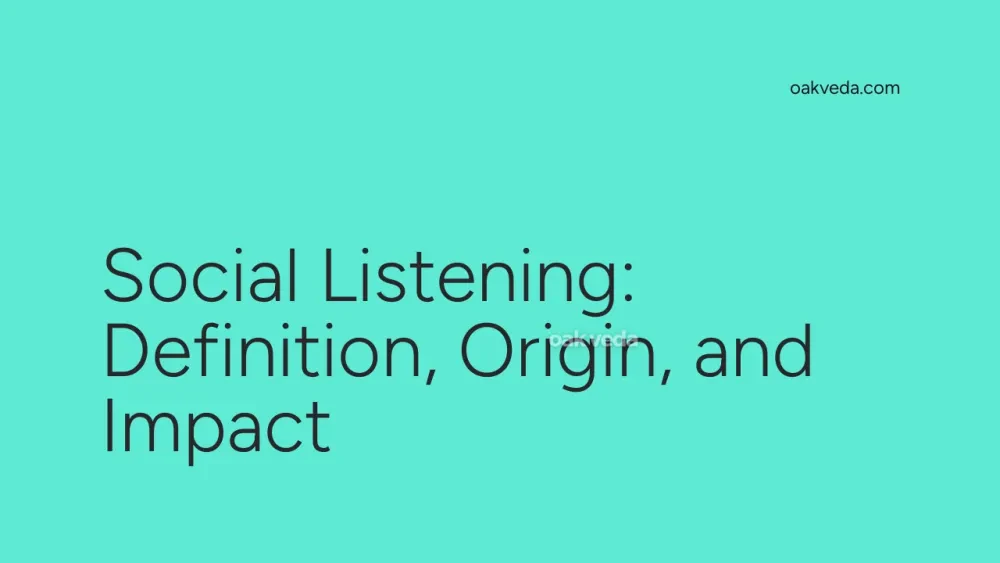
What is Social Listening?
Social listening is a sophisticated marketing strategy that involves monitoring and analyzing online conversations across various digital platforms. It goes beyond simply tracking mentions of a brand or product, delving deeper into customer sentiment, preferences, and behaviors. By gathering data from social media platforms, forums, blogs, and other online sources, businesses can gain valuable insights to inform their marketing and overall business strategies.
Origin and Development of Social Listening
The concept of social listening emerged alongside the rise of social media platforms in the early 2000s. As businesses recognized the wealth of information available through online conversations, they began developing tools and techniques to capture and analyze this data. The evolution of big data analytics and artificial intelligence has significantly enhanced the capabilities of social listening, allowing for more accurate sentiment analysis and trend prediction.
How Social Listening Works
Social listening typically involves a three-step process:
-
Data Collection: This initial step involves gathering relevant data from various online sources. Advanced tools are used to collect mentions of specific brands, products, or topics, as well as related hashtags and keywords.
-
Data Analysis: Once collected, the data is processed using sophisticated algorithms. This analysis can include sentiment analysis (determining whether mentions are positive, negative, or neutral), trend identification, and demographic insights.
-
Actionable Insights: The final step involves interpreting the analyzed data to derive meaningful insights. These insights can then be used to inform various business decisions, from product development to customer service improvements.
Types of Social Listening
Social listening can be categorized into several types based on its focus:
- Brand Monitoring: Tracking mentions and sentiment around a specific brand or product.
- Competitor Analysis: Monitoring competitors' online presence and customer interactions.
- Industry Trends: Identifying emerging trends and topics within a particular industry.
- Customer Feedback: Gathering and analyzing customer opinions and experiences.
- Crisis Management: Detecting and responding to potential PR issues or negative sentiment.
Popular Examples of Social Listening
Many brands have successfully leveraged social listening to improve their products and marketing strategies. For instance:
- Netflix uses social listening to gauge audience reactions to new shows and movies, informing their content creation decisions.
- Airbnb monitors customer feedback to identify and address common issues, improving their service quality.
- Coca-Cola utilizes social listening to track the success of their marketing campaigns and adjust their strategies in real-time.
Impact of Social Listening on Social Media Culture
Social listening has significantly influenced social media culture by:
- Encouraging brands to be more responsive to customer feedback
- Fostering a culture of transparency and open communication between businesses and consumers
- Driving the creation of more personalized and targeted content
- Influencing the development of new features on social media platforms to facilitate better business-customer interactions
Controversies Surrounding Social Listening
While social listening offers numerous benefits, it's not without controversies:
- Privacy Concerns: Some users worry about the extent to which their online conversations are being monitored and analyzed.
- Data Accuracy: There are ongoing debates about the accuracy of sentiment analysis and the potential for misinterpretation of data.
- Ethical Use of Data: Questions arise about the ethical implications of using personal conversations for business purposes.
How Brands and Influencers Use Social Listening
Brands and influencers leverage social listening in various ways:
- Product Development: Using customer feedback to improve existing products or create new ones.
- Content Creation: Identifying topics and trends that resonate with their audience.
- Customer Service: Promptly addressing customer concerns and queries.
- Influencer Partnerships: Identifying and collaborating with relevant influencers in their niche.
- Crisis Management: Detecting and managing potential PR issues before they escalate.
Future Trends Related to Social Listening
The future of social listening looks promising, with several emerging trends:
- AI-Powered Analysis: More advanced AI algorithms will provide deeper, more accurate insights.
- Real-Time Response: Faster data processing will enable near-instantaneous responses to customer feedback.
- Cross-Platform Integration: Tools will better integrate data from various platforms for a more comprehensive view.
- Predictive Analytics: Social listening will increasingly be used to predict future trends and customer behaviors.
- Voice and Visual Listening: As voice and visual content grow, social listening will adapt to analyze these formats.
FAQs about Social Listening
-
How is social listening different from social monitoring? Social listening goes beyond monitoring by analyzing the data to derive actionable insights, while social monitoring simply tracks mentions and engagement.
-
What tools are commonly used for social listening? Popular tools include Hootsuite Insights, Sprout Social, Brandwatch, and Mention.
-
Can small businesses benefit from social listening? Absolutely. Social listening can help businesses of all sizes understand their customers better and improve their products or services.
-
Is social listening limited to social media platforms? No, it can include various online sources such as blogs, forums, and review sites.
-
How can businesses ensure ethical use of social listening data? By being transparent about data collection, respecting user privacy, and using the insights to genuinely improve customer experiences rather than for manipulation.
In conclusion, social listening has become an indispensable tool in the modern marketing landscape. By providing valuable insights into customer behavior and preferences, it enables businesses to make data-driven decisions and foster stronger connections with their audience. As technology continues to evolve, social listening will undoubtedly play an increasingly crucial role in shaping business strategies and improving customer experiences.
You may be interested in:
- Watch Time: Definition, Origin, and Impact on YouTube Success
- ROI in Marketing: Definition, Origin, and Impact
- CPC (Cost-Per-Click): Definition, Origin, and Impact
- Koji: Definition, Origin, and Impact on Social Media
- IMO: Definition, Origin, and Impact on Social Media
- Community Manager: Definition, Origin, and Impact

